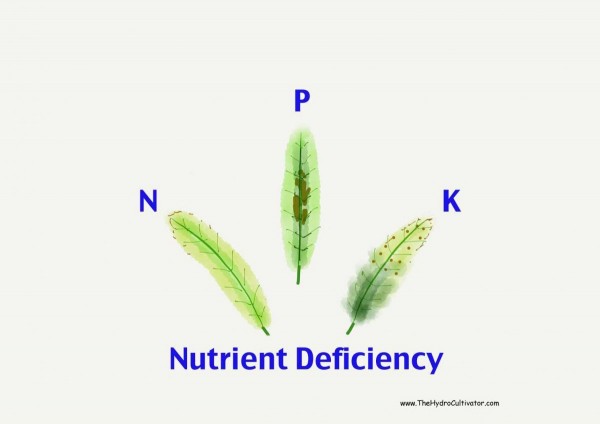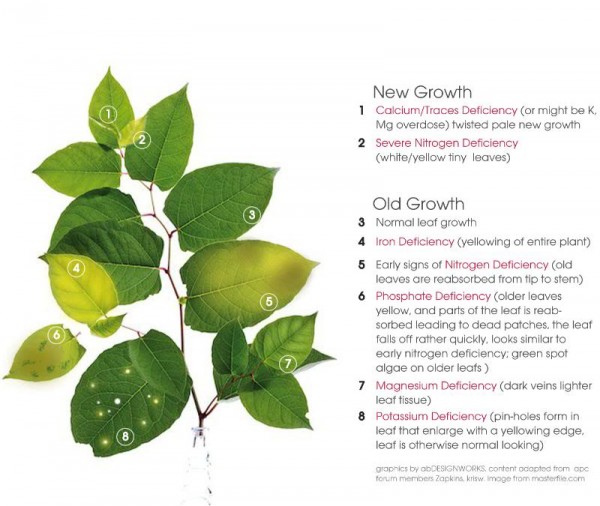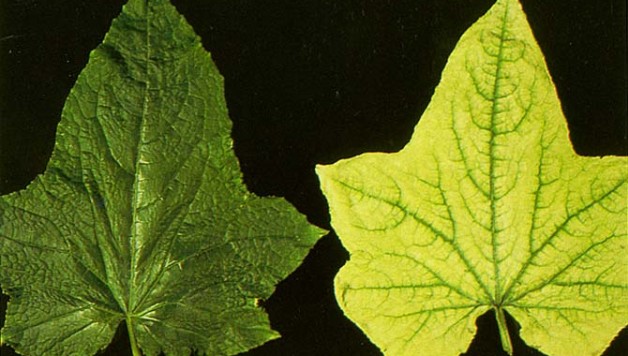Just like humans, plants need food to survive and maintain healthy growth. As a grower, it’s your responsibility to ensure that your plants are receiving a well-rounded diet. This diet comes in the form of nutrients.
If your plant is low on any of the three essential nutrients (Nitrogen, Phosphorus, Potassium) then you’ll notice certain symptoms. It’s possible to confuse a nutrient deficiency with the signs of over or underwatering. If you notice anything off in the color or health of the leaves, you’ll want to first ensure your water levels have been adequate and consistent.

Symptoms of Nitrogen, Phosphorus and Potassium nutrient deficiencies in plants. Image via TheHydroCultivator.com
Nitrogen Deficiency
Nitrogen is a nutrient that initiates photosynthesis which is why it’s absolutely essential that your plants receive enough of it. Without a sufficient supply of Nitrogen, your plants’ leaves will become discolored, either brown or yellow. This is called chlorosis and is the result of a lack of chlorophyll production. The plant itself will likely not continue to grow or will grow slowly.
Phosphorus Deficiency
Phosphorus is a nutrient that helps the plant by strengthening its roots and seeds therefore leading to an overall healthier reproduction. In the case of a Phosphorus deficiency, you’re going to notice a darkening of the leaves.
Potassium Deficiency
Potassium is a nutrient ultimately responsible for growth and health. Potassium helps a plant’s immune system which is important even in indoor gardening. If the leaves have begun to discolor at the edges or the plant isn’t blooming how it should, then this is likely a sign of a Potassium deficiency.

Nutrient deficiency diagram show common symptoms in new and old growth leaves. Image via AquariumForum.com
Treating Nutrient Deficiency
It’s easy enough to treat and reverse the signs of a nutrient deficiency by ensuring you’re adding in fertilizer. As with anything, you’ll want to use as close to a natural product as possible. There are many organic fertilizers available today which are better alternatives to chemical fertilizer options.
Other Nutrient Inhibitors
Nutrient deficiencies can be amplified if any of these conditions are not ideal:
- Nutrient EC and the frequency of feeding
- Humidity levels are too high or low (prevents even nutrient distribution)
- Nutrient solution isn’t being changed out often enough in a recirculating system
- Nutrient pH level isn’t correct (prevents nutrient uptake through plant roots)
Ensuring all of your growing conditions are appropriate will of course boost your plants’ abilities to absorb nutrients. These conditions should be monitored regularly and if they are properly maintained then over time it will reduce the risk of losing your plants as they will grow healthier and stronger.
For a full list of nutrient deficiency symptoms check out this chart from Flairform.
